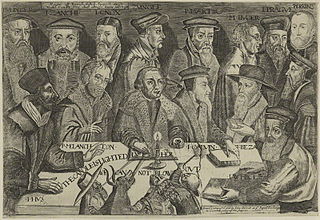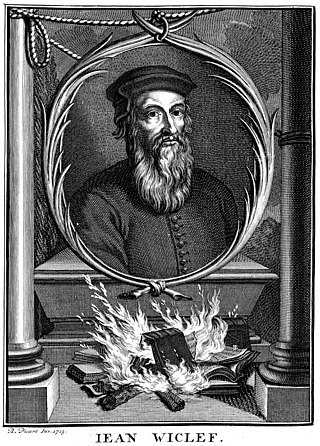Anabaptism is a Christian movement which traces its origins to the Radical Reformation. Anabaptists believe that baptism is valid only when candidates freely confess their faith in Christ and request to be baptized. Commonly referred to as believer's baptism, it is opposed to baptism of infants, who are not able to make a conscious decision to be baptized.

Calvinism, also called Reformed Christianity, is a major branch of Protestantism that follows the theological tradition and forms of Christian practice set down by John Calvin and various other Reformation-era theologians. It emphasizes the sovereignty of God and the authority of the Bible.
A Selection of Hymns for Public Worship is a hymn book compiled by William Gadsby, a minister of the Gospel Standard Strict Baptists in England. First published in the 19th century, it is still in current use.
Hyper-Calvinism is a branch of Protestant theology that places strong emphasis on supralapsarianism, or salvation from eternity, where the atonement of Christ was and is difficult for the non-elect to understand, where man has little to do with his salvation, there being nothing man can do to resist being saved, wherein evangelism was given lower emphasis as compared to traditional Calvinism, and where assurance of salvation was felt within a person, identified by introspection.

Andrew Fuller was an English Particular Baptist minister and theologian. Known as a promoter of missionary work, he also took part in theological controversy.
Protestant Reformers were theologians whose careers, works and actions brought about the Protestant Reformation of the 16th century.

Memorialism is the belief held by some Christian denominations that the elements of bread and wine in the Eucharist are purely symbolic representations of the body and blood of Jesus Christ, the feast being established only or primarily as a commemorative ceremony. The term comes from the Gospel of Luke 22:19: "Do this in remembrance of me", and the attendant interpretation that the Lord's Supper's chief purpose is to help the participant remember Jesus and his sacrifice on the Cross.
The Fellowship of Independent Evangelical Churches (FIEC) is a network of 638 independent evangelical churches mainly in the United Kingdom.

The reformed confessions of faith are the confessional documents of various Calvinist churches. These express the doctrinal views of the churches adopting the confession. Confessions play a crucial part in the theological identity of reformed churches, either as standards to which ministers must subscribe, or more generally as accurate descriptions of their faith. Most confessions date to the 16th and 17th century.

William Gadsby (1773–1844) was an English Strict Baptist pastor, hymn writer and church planter. He is often seen of as the father of the Strict and Particular Baptist movement in England. Although he was not formally educated, Gadsby was regarded by his contemporaries as an excellent preacher and pastor who championed the cause of social justice and opposed the established Elizabethan Church.

The Gospel Magazine is a Calvinist, evangelical Christian magazine from the United Kingdom, and is one of the longest running of such periodicals, having been founded in 1766. Most of the editors have been Anglicans. It is now published bi-monthly.

Calvinism originated with the Reformation in Switzerland when Huldrych Zwingli began preaching what would become the first form of the Reformed doctrine in Zürich in 1519.

Protestantism is a branch of Christianity that follows the theological tenets of the Protestant Reformation, a movement that began in the 16th century with the goal of reforming the Catholic Church from perceived errors, abuses, and discrepancies.

Zoar Strict Baptist Chapel is a Strict Baptist place of worship in the hamlet of Lower Dicker in the English county of East Sussex. Founded in 1837 and originally known as The Dicker Chapel, the "large and impressive" Classical/Georgian-style building stands back from a main road in a rural part of East Sussex. The 800-capacity building included a schoolroom and stables when built, and various links exist between people and pastors associated with the chapel and other Strict Baptist and Calvinistic causes in the county, which is "particularly well endowed with [such] chapels".

The Grove Road Strict Baptist Church, is a Strict Baptist place of worship in the town of Eastbourne in the English county of East Sussex. The chapel was built in 1881.

Proto-Protestantism, also called pre-Protestantism, refers to individuals and movements that propagated various ideas later associated with Protestantism before 1517, which historians usually regard as the starting year for the Reformation era. The relationship between medieval sects and Protestantism is an issue that has been debated by historians.

Galeed Strict Baptist Chapel is a Strict Baptist place of worship in the North Laine area of Brighton, part of the English seaside city of Brighton and Hove. It was built in 1868 in an "austere Neoclassical" style for members of a newly formed church who had been worshipping in a hired building nearby since seceding from another chapel elsewhere in Brighton in 1867 as a result of doctrinal differences. The chapel, which has changed little since it opened, remains in use by Gospel Standard Strict Baptists and is the only such place of worship remaining in the city. It is situated in a conservation area and is a locally listed building. People associated with Galeed Chapel include the founders of the Evangelical Library and the Gospel Standard Baptist Library, several editors of the Gospel Standard magazine, and the author of a definitive history of the Strict Baptist movement. Regular services are held on Sundays, Wednesdays and Fridays.

Mayfield Baptist Chapel, also known as Mayfield Strict Baptist Chapel, is a place of worship for Gospel Standard Strict Baptists in the village of Mayfield, part of the Wealden District of East Sussex, England. The present chapel was built in 1873 on the site of a predecessor which had opened some years before—possibly as early as the late 18th century. A Strict Baptist church was formally constituted in 1871 when the minister at the time, Eli Page, adopted these views; previously it had simply been a "preaching place" serving Christians with various Protestant Nonconformist views. The simple Vernacular-style building remains in use as a Strict Baptist chapel.












